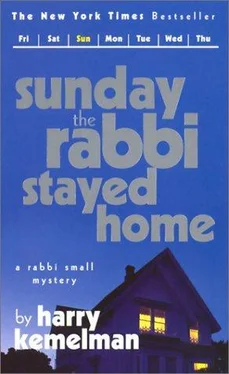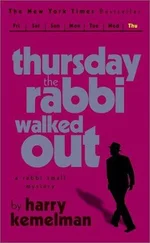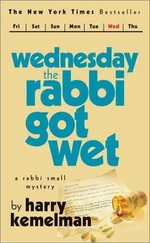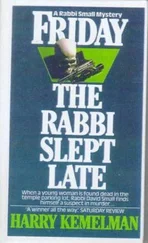Harry Kemelman - Sunday the Rabbi Stayed Home
Здесь есть возможность читать онлайн «Harry Kemelman - Sunday the Rabbi Stayed Home» весь текст электронной книги совершенно бесплатно (целиком полную версию без сокращений). В некоторых случаях можно слушать аудио, скачать через торрент в формате fb2 и присутствует краткое содержание. Город: New York, Год выпуска: 2002, ISBN: 2002, Издательство: iBooks, Жанр: Иронический детектив, на английском языке. Описание произведения, (предисловие) а так же отзывы посетителей доступны на портале библиотеки ЛибКат.
- Название:Sunday the Rabbi Stayed Home
- Автор:
- Издательство:iBooks
- Жанр:
- Год:2002
- Город:New York
- ISBN:978-0743452380
- Рейтинг книги:3 / 5. Голосов: 1
-
Избранное:Добавить в избранное
- Отзывы:
-
Ваша оценка:
- 60
- 1
- 2
- 3
- 4
- 5
Sunday the Rabbi Stayed Home: краткое содержание, описание и аннотация
Предлагаем к чтению аннотацию, описание, краткое содержание или предисловие (зависит от того, что написал сам автор книги «Sunday the Rabbi Stayed Home»). Если вы не нашли необходимую информацию о книге — напишите в комментариях, мы постараемся отыскать её.
Sunday the Rabbi Stayed Home — читать онлайн бесплатно полную книгу (весь текст) целиком
Ниже представлен текст книги, разбитый по страницам. Система сохранения места последней прочитанной страницы, позволяет с удобством читать онлайн бесплатно книгу «Sunday the Rabbi Stayed Home», без необходимости каждый раз заново искать на чём Вы остановились. Поставьте закладку, и сможете в любой момент перейти на страницу, на которой закончили чтение.
Интервал:
Закладка:
“Well, I’m not going to tell him that I’m broke,” he said tartly.
“He’ll see it in your face. He’ll read it in your eves,” she said. “Like I do.” She fumbled in her apron pocket and took out a coin purse. “Here, here’s two dollars. That’s all I can let you have, but you’ll be able to get the bus both ways.” She held the crumpled bills out to him. “Now you make sure you get home in time for dinner.”
“Well, gee, Ma. I mean, I might have some business to talk over. He might ask me to have dinner with him. I can’t just break away and say I’ve got to get home, my folks expect me home for dinner.”
“Well, if you find that you’re going to be delayed, you call up. Just excuse yourself and say you have a previous engagement you’ve got to cancel, and you call up and say you’re going to be late. Now that’s the proper way to do it. And if this man is any kind of businessman, he’ll respect you for it.”
“Okay, Ma. Guess you’re right. Thanks for the money. You’ll get it back no later than Friday.”
From the hall closet he took his light-beige cotton raincoat, turned up the collar, and surveyed himself in the hall mirror. He was satisfied at what he saw—the young collegian, just like in Playboy. From the mirror he could see that his mother was watching him and that she was proud. He winked at his reflection and then with a gay, “Be seeing you,” he left.
Chapter Nineteen
Didi cupped her hand over the mouthpiece of the telephone and whispered to her mother. “Remember that boy from school I told you about? Alan Jenkins? The colored boy? Well, he’s in Lynn and wants to come over. What shall I tell him?”
“Ask him to come over, if you want.” said Mrs. Epstein matter-of-factly. “Does he have a car?”
“He’s got a motorcycle. But what about the cookout—”
“Invite him along if he wants to come.”
“You think it will be all right.”
“I don’t see why not. What’s he like, anyway?”
“Oh, he’s a little older than most of the freshmen; he was out working a couple of years. He’s terribly talented. And he’s easygoing and pleasant—I mean he’s not surly or—you know—angry like some of them. I mean at school, it being an art school, well, it doesn’t make any difference. I mean we don’t think of him as being different, if you know what I mean.”
“Then—” Mrs. Epstein shrugged her shoulders.
Didi uncupped the mouthpiece and said, “Oh, Alan? Sorry to keep you waiting. Look, some of the kids I went to school with—we’re having a cookout on the beach. How would you like to make the scene?… About six or eight of us…. You can? Good—Oh, I just thought of something; I promised our rabbi I’d show him that painting I was working on at school—you know, Moses and the tables of the Law? So why don’t you pick me up there?… No, we won’t get hung up…. All right, here’s what you do: Take the shore road out of Lynn and go along until the first set of traffic lights….”
Alan gunned the motor and then let it die. Didi in white slacks climbed down from behind him, and he walked the bike up the driveway to the garage. “That rabbi seemed like a straight guy,” he said. “Funny, I thought he’d be an old crock with a long beard. I thought all rabbis have beards.”
Didi giggled. “No, just the kids at school. Come to think of it, though, I’ve never seen one with a beard.”
“I figured he’d talk like a preacher—you know, about God and all that.”
“Rabbis really aren’t preachers; they’re more like teachers,” she explained. “Actually, according to our rabbi, his real job is interpreting and applying the law—like a lawyer or a judge.”
Mrs. Epstein greeted them in the living room. “Your first time in Barnard’s Crossing, Mr. Jenkins? Didi has told me so much about you.” He was a nice-looking young man, of a deep coffee-brown. His lips, though bluish, were not over-large. His nose, too, was high-bridged and well-formed. His hair was cut close to his head, and she was pleased to see no attempt had been made either to straighten or to smooth it down. He was of medium height but had a large chest and square shoulders, which seemed tensed at the moment.
“Yes, ma’am. I’ve been to the North Shore a couple of times—to Lynn. There’s a guy—a man who sometimes sells some of my paintings for me there—”
“An art dealer? I didn’t know there was an art store or gallery in Lynn,” she said, offering him a chair.
“No. ma’am. He’s got like a bookstore and greeting cards and some gift items—things like that. He hangs up some of my paintings when he’s got the space, and when he sells one, he pays me.”
“And do you sell many?” she asked.
He laughed, a fine, open laugh. “Not enough to retire on. I’m riding down to New York first thing tomorrow morning, and I was hoping he might have some loot for me.” He shook his head. “Zilch—although he did say he had a couple of people interested in one picture.”
“And what kind of pictures do you paint, Mr. Jenkins?”
“Oh. Alan does these marvelous abstracts—”
An auto horn sounded outside. “There’s Stu now. Come on. Alan.” said Didi.
“Take a sweater, dear. It can get chilly on the Point.”
“Don’t need one.”
“Well, have a nice time, dear. Good-bye. Mr. Jenkins. And good luck on those paintings.”
Chapter Twenty
As Moose found himself picking his way between clumps of trash barrels and groups of squalling children, who spilled all over the street in the South End of Boston, he began to have misgivings. To be sure, the street must at one time have been very fine; it was divided in the middle by a broad grass plot, with wooden park benches set at regular intervals. But the grass even this early in the spring looked ill-cared for, and a litter of papers, tin cans, and bottles had piled up under the benches. Once grand brownstone-front town houses with short flights of granite stairs, each with its wrought-iron railing, were set back from the sidewalk. The ornate wooden doors, which no doubt had had massive brass knockers and brass doorknobs, showed years of wear and abuse; there was a hole in the door where the knocker had originally been, and instead of the doorknob only a round hole with a thong of greasy leather hanging from it to serve the purpose. Peeling, blistered paint showed layers of different colors on the door, flanking which were long, narrow windows suggesting high-ceilinged rooms inside. But most of the windows were cracked, and in one case the window had been shattered and replaced by a piece of weather-beaten plywood. The sidewalks and sides of the houses were liberally sprinkled with chalk graffiti.
Moose found the number he was looking for and climbed the stairs. Finding no bell button (there was only a hole through which a couple of wires protruded), he rapped on the door. He waited a moment and, receiving no answer, pushed the door open. It was held closed by a coiled spring under considerable tension, so that the moment he released it the door slammed shut. At the noise a slatternly old woman poked her head into the vestibule and looked at him inquiringly.
“I’m looking for Mr. Wilcox,” said Moose.
“Top floor, last bell,” she said and closed her door.
Then Moose noticed a row of mailboxes, and he pushed the button under the name. Almost immediately there was an answering “Hello” through the speaking tube.
“I’m Moose Carter, Mr. Wilcox,” he called into the tube. “I spoke to you on the phone.”
“Come on up.”
His initial misgivings were immediately allayed as he stepped inside. The room was large and well-furnished. There was an Oriental rug on the floor and oil paintings in heavy gold frames on the walls; large overstuffed chairs were scattered around the room, and facing a large window, from which could be seen the neighboring rooftops, was a massive sofa. Nearby was a marble-topped desk in carved mahogany and behind it a black-leather modern swivel chair set on a chrome pedestal.
Читать дальшеИнтервал:
Закладка:
Похожие книги на «Sunday the Rabbi Stayed Home»
Представляем Вашему вниманию похожие книги на «Sunday the Rabbi Stayed Home» списком для выбора. Мы отобрали схожую по названию и смыслу литературу в надежде предоставить читателям больше вариантов отыскать новые, интересные, ещё непрочитанные произведения.
Обсуждение, отзывы о книге «Sunday the Rabbi Stayed Home» и просто собственные мнения читателей. Оставьте ваши комментарии, напишите, что Вы думаете о произведении, его смысле или главных героях. Укажите что конкретно понравилось, а что нет, и почему Вы так считаете.












